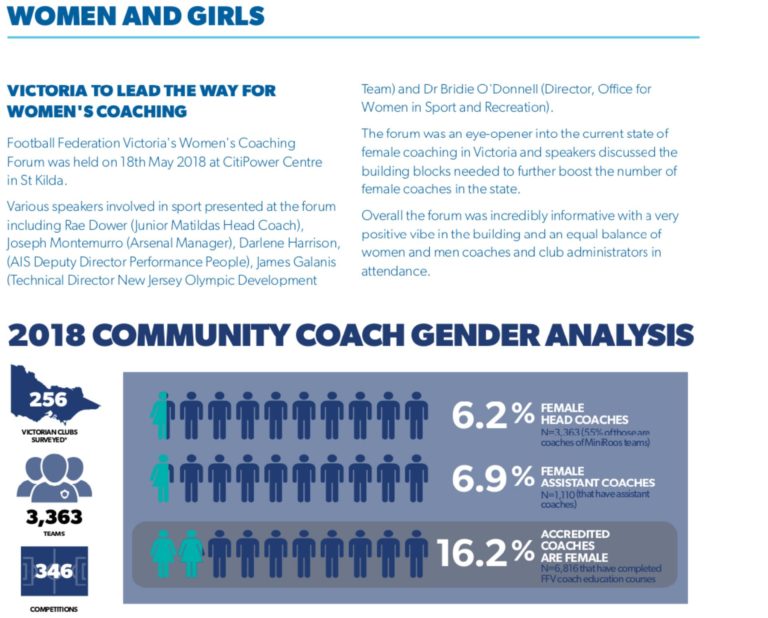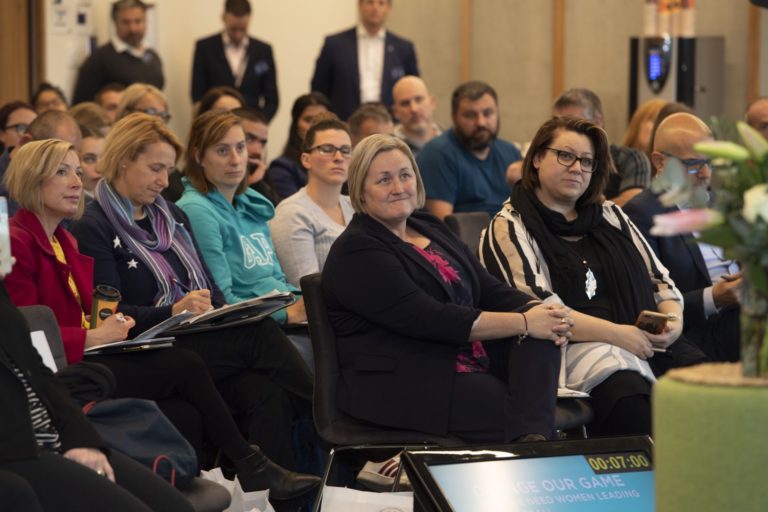With the Matildas participating in June’s World Cup and Australia bidding for the chance to host one, State Member Federations nationwide are participating in Female Football Week.
It’s an initiative that celebrates women’s participation at all levels of the game and Victoria kicked off its Female Football Week on Tuesday 7 May with several events that run through to 13 May.
Just last week the latest results confirmed football as the number participation sport in Australia, with more than 1.76 million playing the round ball game, including 396,000 participants being girls and women.
Victoria is one of the states at the forefront of that progress with their participation increasing by 24 per cent from 2017 with almost 400,000 participants and 19 per cent of those being women and girls.
Greek Australian football administrator Helen Tyrikos has inspired much of that growth through her role as Program Development Manager of Women & Girls at Football Victoria. But despite the increasing numbers, Tyrikos says there are still many barriers that stop females playing football.
“Seven out of the top 12 reasons why women leave the game is due to club culture and coaching,” she told Neos Kosmos.
“Our coaches don’t know how to coach girls. They yell. But girls want information, and they take in information differently and our coaches haven’t been set up for that. Girls question everything, they want a lot of information to be explained. Such as why a coach has made a certain decision. Otherwise girls feel insecure and they over analyse and that’s the kind of stuff that causes them to leave.”

How to empower female coaches
As a result of this research, Tyrikos decided to empower budding female coaches. Her first initiative was to inspire them through Football Victoria’s Women’s Coaching Forum in 2018 that included Rae Dower (Junior Matildas Head Coach), Joseph Montemurro (Arsenal Manager) and Greek Australian James Galanis (Technical Director, New Jersey Olympic Development).
Following on from that, she created the first ever Female Only C-Licence coaching course in Australia and this strategy has seen the number of accredited female coaches increase to 16.2 per cent.
“That certainly wasn’t the case 10 years ago,” says Tyrikos. “That doesn’t mean that they all have jobs. It just means that they are doing the training because some clubs still have a real problem when it comes to employing women because there is still a massive bias towards women coaching teams.”
Seeking to eliminate this prejudice, Tyrikos spilt the C-License into two categories when she made the first part of the course a female only coaching environment.
“It’s because girls tend to feel like impostors in that space; they don’t speak up in a coaching course because they feel like the men take over,” she says. “Part B is when they move into the regular course that includes the men because they have to be able to hold their own in an environment that is mixed. A lot of the learning also happens in the workshop and conversations in the class so they get to tap into the experience of the men as well.”

Not content with just empowering women in coaching, Tyrikos also produced a program for more women to be part of the boardroom.
“Last year I created an administrative leadership program and I created 17 leaders who are now on the boardrooms of clubs,” she says proudly. “They are amazing and they have influenced so many women themselves … bringing gender balance to their committee. Diversity at that level is so, so important. Having different perspectives when decisions are being made whether they get voted in or out is imperative as it provides the opportunity to share different viewpoints. This is important for success of clubs in the future, especially as the environment is changing.”
The other barrier that concerns Tyrikos is when girls reach 15 or 16 years of age – when many leave the sport. To curb this situation, Football Victoria with the help of the Federal Government invested in the Emerging Matildas program, focused on developing female players aged 17 and above.
“What that is going to do is close the gap of the 17 year olds that get displaced after they are finished with our Victorian National Training Centre Program when they are 16,” she explained.
“At the age of 17 they cannot participate with us anymore; the club environments don’t always offer what they need in an elite perspective. So we created that program along with some other parents to support those girls. The second thing we are also doing is lobbying government to have the High Performance Matildas Facility built here in Victoria. That would house the Football Victoria Offices as well, where we can have events and accommodation for players and run international tournaments.”
The Greek Australians behind the rise of Women’s Football in Victoria
Some of the rising stars that have come out of the Victorian system include three Greek Australians – current Australian National Youth Team internationals Sofia Sakalis, Nia Stamatopoulos and Page Zois whose journey to the W-League featured on the ABC TV Show ‘Kick’. Tyrikos believes that program is a big reason why the number of girls playing football in Victoria has increased, and praised the work of Greek Australian film maker Dean Georgiou for his part in the production.
“The work that he had done over the past two years has been instrumental in getting the game going and increasing participation,” she says. “The ‘Kick’ series lifted the profile of the girls. We use this term a lot. ‘if you can’t see it, then you can’t be it’. If girls don’t see the stories of these girls pursuing their dreams then the barriers stop them.”
They have since teamed up with Georgiou to create a video for Female Football Week. It features girls from different multicultural backgrounds saying, “I am a footballer”, in a bid to show that no matter what shape, size or background one is, you can play football, explained Tyrikos.
Georgiou revealed that the Neos Kosmos story that featured ‘Kick‘ led to TV stations in Greece interviewing Sakalis and Stamatopoulos in a bid to inspire young girls to take up football.
“Since that story, ERT and Star TV contacted us a couple of months ago and some of the girls to do some interviews,” he told Neos Kosmos.
“Yes ‘Kick’ has become international, but I’ve also wanted to be known as a male who champions women’s football. The ‘I Play Football’ commercial I did for FV (which has over 20,000 views) is evidence of all the years of hard work in promoting female footballers, which include three Greek Australian girls from the Clifton Hill football club. It’s important that women’s football grows and I think Australia has the capacity to produce the best female footballers in the world.”
As part of Football Victoria’s Female Football Week you can apply to join free female only skills training courses and free female only level 4 referee courses. For more information and other events visit https://www.footballvictoria.com.au/news/football-victorias-female-football-week









